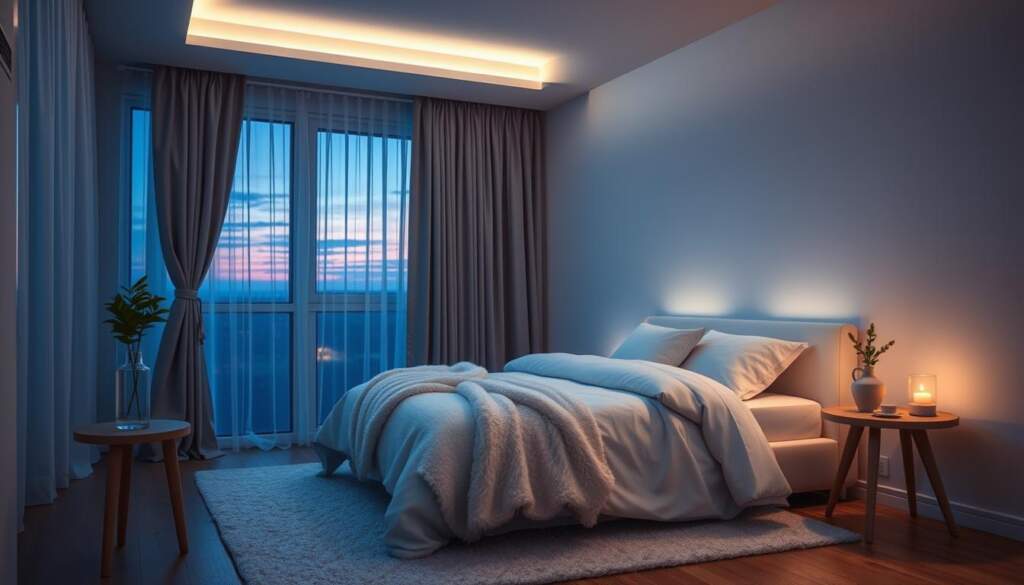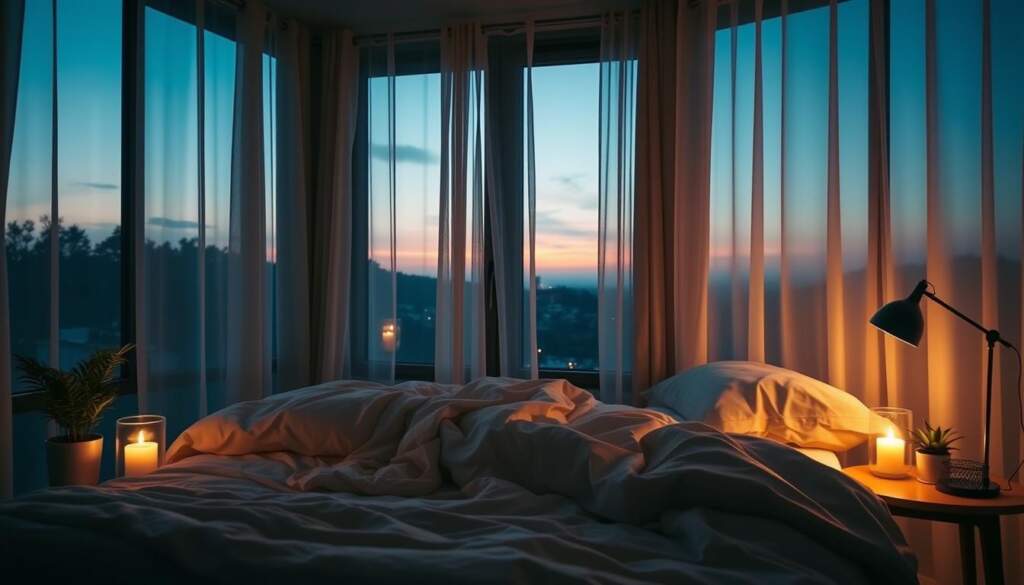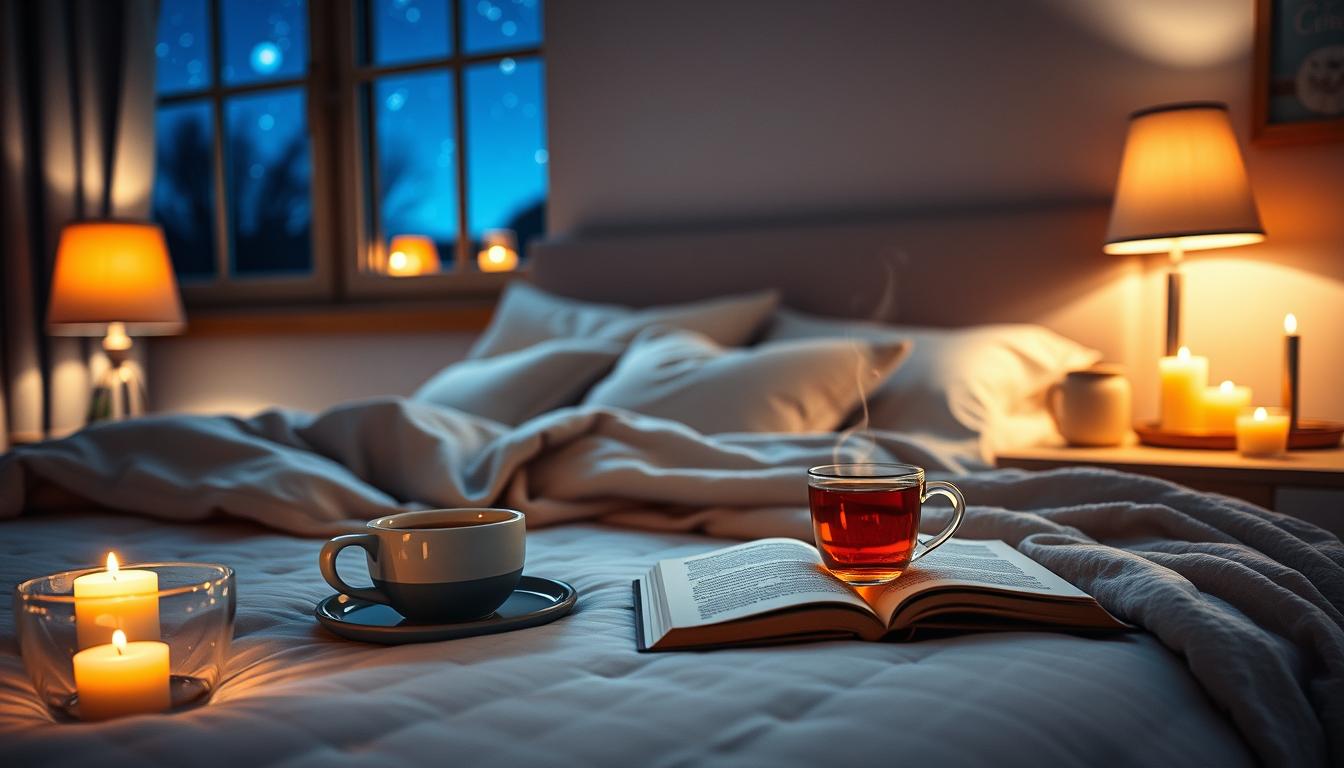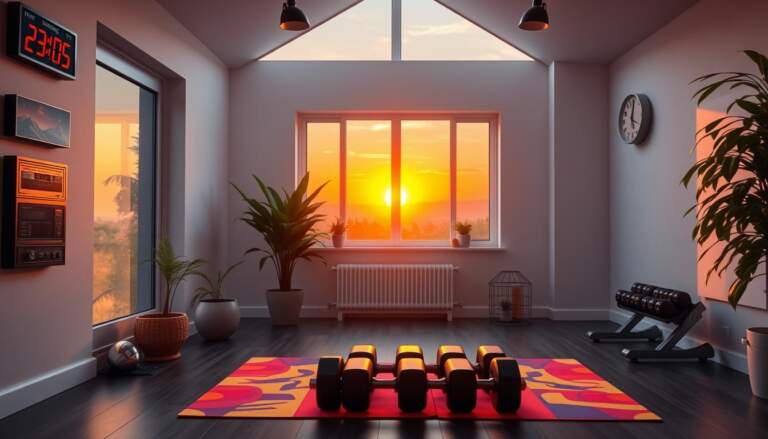As daylight fades, a carefully curated bedtime routine can be your best ally in the quest for better sleep. Not only does it serve as a bridge to the land of dreams, but it also reinforces healthy sleep hygiene. A regular routine, featuring relaxing pre-sleep activities, may be the ticket to overcoming the sleep deprivation that plaques 85% of adults1. Join us as we delve into the art of unwinding, guiding you to a state of nighttime tranquility.
Key Takeaways
- Establish a regular bedtime to signal your brain it’s time to wind down2.
- Limit evening electronic use to prevent blue light from disrupting melatonin production13.
- Opt for a light evening snack instead of heavy meals or alcohol to avoid sleep disturbances1.
- Create a sleep-conducive environment, maintaining a cool room temperature between 65 to 68 degrees Fahrenheit1.
- Incorporate reading, meditation, or journaling into your nighttime ritual to enhance sleep quality1.
- Explore relaxation techniques like deep breathing exercises and yoga to improve sleep quality1.
- Listen to calming music to unwind before bed, enhancing the overall relaxation experience1.
Understanding the Benefits of a Bedtime Routine
A consistent bedtime routine is more than just a way to end the day; it’s a critical component for enhancing your overall health and well-being. By aligning your habits with your natural sleep-wake cycle and encouraging melatonin production, a bedtime routine can significantly improve your sleep quality and foster a consistent sleep schedule.
The Science of Sleep-Wake Cycles
Our bodies operate on a natural sleep-wake cycle, which is essential for optimal health. This cycle, deeply influenced by the light and darkness of our environment, tells our bodies when it is time to be awake and when it is time to sleep. Adhering to a consistent bedtime schedule aligns with this cycle, reducing the time it takes to fall asleep and enhancing sleep quality4.
Optimizing Your Body’s Natural Melatonin Production
Melatonin, the hormone responsible for sleep regulation, has its production peaked during the evening when exposure to light decreases. To boost your body’s natural melatonin production, engaging in activities like reading or taking a warm bath can be especially effective. These activities increase relaxation and have been proven to prepare the body for sleep by lowering stress levels significantly within just minutes5.
The Impact of Consistency on Sleep Quality
Establishing and maintaining a consistent sleep schedule contributes to better sleep quality and general health. Cognitive Behavioral Therapy for Insomnia (CBT-I) suggests that routines leading up to bedtime create cues for the body to prepare for sleep, resulting in improved sleep patterns and mental health outcomes. This method shows lasting effects that surpass those of sleep medications6. Consistently going to bed at the same time each night further stabilizes your sleep schedule and synchronizes your sleep-wake cycle4.
| Activity | Impact on Sleep Quality |
|---|---|
| Turning off electronics before bed | Reduces arousal, making it easier to fall asleep4 |
| Reading | Lowers stress by 50%, aiding quicker sleep onset5 |
| Warm bath/shower | Cools body temperature, enhancing deep sleep quality4 |
| Mindfulness and meditation | Reduces anxiety, improves melatonin levels, and assists in insomnia5 |
| Consistent bedtime | Promotes synchronization with natural sleep-wake cycle, improving overall sleep4 |
Crafting the Ideal Environment for Slumber
Transforming your bedroom into a sleep oasis is essential for achieving restorative sleep. A quiet bedroom environment not only supports the physical aspects of rest but also the psychological transition from wakefulness to sleep. According to recent studies, setting up the ideal sleep temperature between 60 to 67 degrees Fahrenheit is crucial for uninterrupted slumber7. Additionally, maintaining a consistent bedtime and waking time enhances both sleep quality and duration significantly7.
Experts recommend using blackout curtains and minimizing exposure to electronic devices before bedtime to prevent sleep disturbances caused by light89. This aligns with findings that exposure to blue light can impede melatonin production, which is essential for maintaining our circadian rhythms8. Incorporating bedding made from natural fibers like cotton, linen, or bamboo can also enhance comfort by ensuring better air circulation and temperature regulation during sleep78.
Moreover, the ambiance of your bedroom can influence sleep quality. Engaging in relaxation techniques such as aromatherapy with essential oils like lavender or chamomile might reduce cortisol levels and foster a serene mental state conducive to sleep7. Additionally, keeping your bedroom clean and decluttered minimizes distractions and promotes tranquility, setting the stage for a peaceful night8.


To emphasize the importance of the ideal sleep temperature, consider the discomfort caused by extreme temperatures. Bedrooms that are too cold can lead to muscle stiffness, while overly warm rooms might cause night sweats or dehydration8. Keeping your bedroom at the recommended 65 degrees Fahrenheit creates conducive conditions for faster sleep onset and prevents night-time awakenings8.
| Element | Description | Impact on Sleep |
|---|---|---|
| Temperature | 60-67°F (optimal) | Supports natural sleep-wake cycle and prevents disruptions |
| Lighting | Dimmed, soft lighting | Promotes melatonin production, critical for sleep regulation |
| Bedding Material | Cotton, Linen, or Bamboo | Enhances comfort through better air circulation and moisture management |
| Room Cleanliness | Tidy and clutter-free | Reduces anxiety and distractions, enhancing mental relaxation |
Adopting these practices not only improves your sleep quality but also turns your bedroom into a sanctuary where every night leads to a rejuvenating morning. Remember, these adjustments to your sleep environment can profoundly influence your overall well-being9.
Personalizing Your Pre-Sleep Routine to Enhance Restfulness
Creating a personalized pre-sleep routine not only contributes to improved sleep quality but also enhances overall well-being. Here, we explore various components that can be tailored to suit individual needs and preferences, effectively setting the stage for a restful night.
Digital Detox: Electronics and Blue Light
Implementing an electronic curfew by turning off devices at least an hour before sleep can significantly improve sleep quality by reducing exposure to sleep-disruptive blue light10. Engaging in a digital detox each evening helps reinforce your body’s natural sleep-wake cycle and prepares your mind for sleep11.
Evening Snacks and Drinks That Promote Sleep
Incorporating sleep-inducing snacks and drinks, such as cherries or a cup of herbal tea, into your evening ritual can aid in faster sleep onset. These items naturally contain elements that support melatonin production, thereby enhancing sleep quality10.
Cultivating Calm: Bathing, Skincare, and Teatime
A calming bath routine, complete with essential oils and perhaps followed by a gentle skincare regime, can significantly reduce stress and soothe the senses. Pairing this with a quiet teatime creates an ideal atmosphere for relaxation and readiness for sleep12.
Stretching and Mindfulness: Yoga and Meditation
Engaging in light stretching or mindfulness meditation before bed can profoundly impact your ability to relax and prepare for sleep. Activities such as yoga help in releasing physical tension, while meditation techniques like deep breathing or progressive muscle relaxation reduce mental stress and improve sleep efficiency12.
Setting the Stage: Dim Lights, Aromatherapy, and Soothing Sounds
Creating a serene sleeping environment involves more than comfortable bedding. Dimming the lights an hour before bed supports your circadian rhythm, while aromatherapy using lavender or chamomile can enhance the sense of tranquility. Incorporating soothing sounds such as gentle rain or ocean waves can further calm the mind, promoting a deeper, more restorative sleep10.


Maintaining a consistent sleep schedule and engaging in pre-sleep rituals are essential for enhancing the quality of your sleep and overall health11.
Conclusion
In reflecting on the diverse strategies and insights shared, it’s clear that establishing a peaceful bedtime routine is more than just a nightly habit; it’s a comprehensive approach to enhancing one’s quality of life through improved sleep hygiene. Delving into the science of sleep-wake cycles underscores the importance of regularity in sleep patterns, which research has consistently tied to fewer disturbances and enhanced sleep quality1314. By dedicating time to unwind through activities such as reading, taking a warm bath, or practicing yoga, we create the necessary cues for our bodies to transition smoothly into a state of relaxation, setting the stage for restful sleep1314.
Avoiding stimulants like caffeine and disconnecting from the blue light of electronics before bed are critical sleep improvement strategies that support our body’s melatonin production1314. As we craft tranquil environments and engage in mindful practices, from sipping chamomile tea to meditative breathing, we signal our brains that it’s time to shut down, easing into a night of rejuvenating sleep1415. Moreover, adjusting daily tasks and evening chores can free up time for these beneficial practices, helping to prevent the scene of rushing and stress that can impede our journey to slumberland15.
Lastly, it is fundamental to remember that these routines act as a cornerstone for not only a better night’s sleep but for improved overall health, cognitive function, and daily productivity14. By investing in a customized pre-sleep ritual, we gift ourselves the prospect of waking up revitalized, ready to embrace the day with vigor and clarity, thanks to the restorative power of a restful night’s rest. Embrace these practices, and allow your nightly retreat to become a sanctuary for both mind and body.
FAQ
What are the core components of a bedtime routine?
How can a consistent bedtime routine improve my sleep quality?
Why is it important to avoid electronics before bedtime?
What are some relaxing pre-sleep activities I can incorporate into my evening routine?
Can the temperature of my bedroom really affect my sleep?
What kind of snacks are good for sleep?
How can I create a sleep oasis in my bedroom?
What does ‘setting the stage’ mean in terms of creating a serene sleeping environment?
Why is it recommended to use the bed primarily for sleep?
What bedtime cues can I use to reinforce my sleep routine?
Source Links
- Bedtime Routines for Adults – https://www.sleepfoundation.org/sleep-hygiene/bedtime-routine-for-adults
- Best Bedtime Routine For Good Sleep – Sleep Care Online – https://www.sleepcareonline.com/articles/ideal-bedtime-routine-for-adults/?srsltid=AfmBOooE0Fgh0mV1e965w0zHy9AeYPOATxfXPgKQKPoTLaD_QeWeYtS9
- 10 Steps to Design a Better Bedtime Routine – https://sleepdoctor.com/sleep-hygiene/bedtime-routine/
- Everyone Benefits from a Bedtime Routine. Here’s How to Build One You’ll Actually Stick With – https://www.onepeloton.com/blog/bedtime-routine/
- How to Sleep Better with a Bedtime Routine – https://www.heart.org/en/healthy-living/healthy-lifestyle/sleep/how-to-sleep-better-with-a-bedtime-routine
- Establishing a Bedtime Routine for Better Sleep – https://www.dawn.health/blog/establishing-a-bedtime-routine-for-better-sleep
- Enhance Sleep Hygiene: Simple Tips for a Better Night’s Rest – https://www.thesleepreset.com/blog/improve-sleep-hygiene-with-these-simple-tips
- How to Create a Sleep-Friendly Environment at Home | TruCentered Chiropractic Care | Chiropractor in Annapolis, MD – https://www.chiropractorsannapolis.com/blog/how-to-create-a-sleep-friendly-environment-at-home
- An hour-by-hour guide to your bedtime routine – https://www.vox.com/even-better/23894562/hour-by-hour-guide-bedtime-routine
- Creating a Sleep Routine – 6 Steps to Better Sleep – https://hr.wustl.edu/creating-a-sleep-routine-6-steps-to-better-sleep/
- 6 steps to better sleep – https://www.mayoclinic.org/healthy-lifestyle/adult-health/in-depth/sleep/art-20048379
- Enhancing Your Sleep Routine for Better Rest – Be Well Solutions – https://www.bewellsolutions.com/enhancing-your-sleep-routine-for-better-rest/
- Crafting a Healthy Bedtime Routine for Better Sleep – https://medrec-m.com/news/crafting-a-healthy-bedtime-routine-for-better-sleep.html
- Bedtime Routines to Help You Fall Asleep Fast | BetterSleep – https://www.bettersleep.com/blog/bedtime-routines-to-help-you-fall-asleep-fast
- How Do I Create an Evening and Bedtime Routine? – Optimal Living Daily – https://oldpodcast.com/evening-bedtime-routine/



